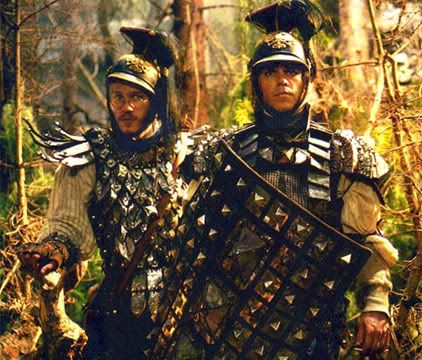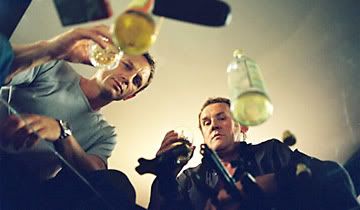 Joseph Morris Scopophilia contributor
Joseph Morris Scopophilia contributor When we last left director Terry Gilliam, he was stranded in development hell, desperately trying to complete the under funded
The Man Who Killed Don Quixote. With a little help from the Weinstein brothers, Gilliam finally gets to complete another film,
The Brothers Grimm a fast paced romp and a rarity in Hollywood, a popcorn muncher with brains and guts.
The plot involves our two titular brothers Wilhelm (Matt Damon) and Jacob (Heath Ledger shorn of his trademark pretty-boy blond locks), a pair of con artists who maneuver from little superstitious German town to little superstitious German town, conning the local populace into believing they're being haunted, and then "disposing" of the ghosts and ghouls.

Will is the pragmatic, street smart, con artist of the pair. He is full of bluster and greed, and has no problem with exploiting other people's imaginations towards his own ends. Jacob is the dork. He keeps of journal of their exploits, turning fake monsters into real ones with his pen. Jacob creates the fiction, and Will executes it, using an accountant's mind to calculate the exact cost of their equipment (plus a little extra to pad the coffers, of course) and then charging the townsfolk for it.
But of course, the film is set on the verge of the Age of Reason, and this is French-occupied Germany to boot. Our boys are ultimately caught by a French general named Delatombe (Jonathan Pryce) who is wise to their schemes. In return for amnesty, the Brothers are sent to a town where a similar huckster is haunting the local townsfolk, and, more horrifyingly, abducting little girls.
The Brothers, accompanied by the Italian torturer (played by Peter Stormare) Cavaldi (to make sure they don't run for it), travel to the small town and quickly discover that they're not dealing with a con man. The supernatural threat is very real, and the story tellers are now trapped within a story that themselves have absolutely no control over. The cast is solid. Damon seems to be most comfortable playing fast talking hustlers who have more brains than brawn, so this is a pretty apt casting for him. Heath Ledger, on the other hand, has to step out of his more traditional comfort zone to play the flighty, excitable Jacob.
It's fairly impressive to watch the pretty boy lead transform quite effortlessly into an Early World geek. Jonathan Pryce, a Gilliam regular who also appeared in
Brazil (1985) and
The Adventures of Baron Munchausen, (1988) plays the French general with gleeful, pompish hamminess befitting a man who has fancy dinner parties on one floor of his castle, and a fully realized torture chamber directly below.
Peter Stormare, playing Cavaldi, the Brother's keeper turned unwitting ally, is a bizarre combination of over the top menace, and even more over the top comic relief. Female members of the cast are, as is usual for a Gilliam film, few and far between, with Monica Bellucci serving as little more than an illusion of the Mirror Queen. Lena Headey has a slightly more developed role as Angelika, both brothers love interest, but she even feels a little tacked on.
As far as the actual Grimm Fairy Tales go, they're all floating around in here, like the ingredients of a stew. But ultimately, this is a Gilliam film, which means the director is far more interested in forging his own paths through the dark and forbidding forest. As with all things Gilliam, the strength of the film lies in its satire and its visual explosiveness. Will spends the entire film lording it over his brother for his romantic notions, and of course, the brothers find themselves in a situation where only romantic notions can save the day.
At one point in the film, Delatombe orders the destruction of the haunted forest, and then sits calmly, enjoying a fine meal as fire and explosions go off all around him. Delatombe and Cavaldi represent Reason, Logic, and Control, three things that are never welcome in a Gilliam film, and always meet with a bitter end. As for the visuals, I've often commented that the current wave of technology has made virtually anything possible in film, yet with each passing year, films seem to be becoming less imaginative. It's always nice when a true master gets a hold of some technology and puts it to use.
Gilliam, as usual, gives us an old world that dirty, dingy, and none too hygienic. He also gives us child-eating horses, dancing, face-eating blobs, and a wolf that is also a man, among other visual delights.
The Brothers Grimm is by no means Gilliam's masterpiece.
It lacks the scope of
Brazil, the reckless heart of
Munchausen, comedic wide-eyed, childlike appeal of
Time Bandits (1981), the brutal every which way but looseness of
Fear and Loathing in Las Vegas (1998), and the refined clash of conscious versus unconscious that defined
Twelve Monkeys (1995) and
The Fisher King (1991).
Like most Gilliam films, women seem restricted in their roles (
Fisher King being a massive exception to that rule). The film feels a little short, and the ending felt a bit anticlimactic. But despite these minor flaws, Gilliam's latest film is an enjoyable thrill ride that puts just about every big budget film this season to shame.





